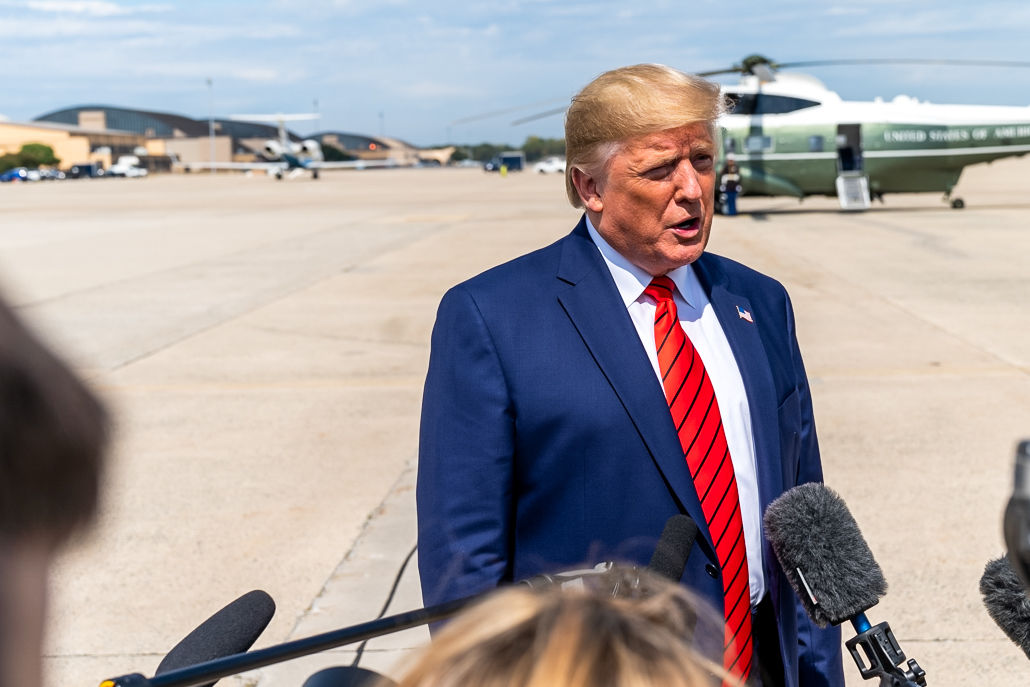House Democrats opened a formal impeachment inquiry last week in the wake of revelations about President Donald Trump’s contact with the leader of Ukraine.
On July 25, Trump had a phone call with Ukrainian President Volodymyr Zelensky in which he pressed Zelensky to investigate Joe Biden and his son Hunter, who was on the board of the Ukrainian energy company Burisma from 2014 until April of this year. Trump said during Joe Biden’s time as vice president, he improperly intervened to protect his son’s business dealings by calling for the firing of a prosecutor who had been overseeing an investigation of Burisma.
Trump has admitted that a week prior to the phone call, he withheld $391 million in military aid to Ukraine, which he allegedly used as leverage while talking to Zelensky. This phone call was publicized by a whistleblower, who the New York Times has identified as a C.I.A. officer detailed to the White House. Having cited “more than a dozen” U.S. officials, the whistleblower made the complaint out of fear of potential abuse of power and a White House cover-up.
The official transcript of the telephone conversation was released on Sept. 24, coinciding with the initiation of a formal impeachment inquiry against Trump. Democrats leading the impeachment effort accuse the president of betraying his oath of office by using a foreign power to debase a rival for his own gain.
Speaker of the House Nancy Pelosi announced the impeachment inquiry, calling Trump’s actions “a breach of his constitutional abilities.”
Pelosi said the House would be focusing on investigating the Ukraine phone call in-depth, assigning the investigation to the House Intelligence Committee. The six key committees responsible for investigating other allegations involving the president will continue their investigations. The Intelligence Committee is being led by Rep. Adam Schiff and is comprised of 12 other Democrats and nine Republican members of the House.
Trump and supporting Republicans say there was no explicit quid pro quo, but this may not be relevant as it relates to impeachment. Dwight Roblyer, a political science lecturer at Texas A&M, said the process of impeachment is a political action, not a criminal action. This means quid pro quo or criminal charges are not required to proceed with an impeachment inquiry.
“The Constitution sets out the requirements for impeachment as treason, bribery or other high crimes and misdemeanors,” Roblyer said. “Most people agree that means a violation of trust. … It doesn’t have to be called some sort of crime because it doesn’t have to meet that standard, since it’s a political process.”
There has never been a U.S. President removed from office, although two presidents have been impeached in U.S. history. Impeachment and removal from office are separate processes that are outlined in the Constitution.
A&M journalism lecturer Tom Burton said although the basis for impeachment is rooted in the Constitution, political biases often taint the public’s view of how the process works.
“When the general public just looks at this as Democrats versus Republicans, they stop listening and stop looking at facts,” Burton said. “I think it’s important that people view facts rather than these notions of partisanism.”
While two presidents have been impeached the impeachment process and removal from office lacks a solidified precedent. Moreover, this can often lead to complexity and confusion among the American public. Burton said the process is complicated and often confusing, but it’s necessary to maintain democracy and American ideals.
“Impeachment is destructive and disruptive, whether or not you support the president,” Burton said. “I think it’s a good thing that we aren’t quick to jump to overthrow our leaders because there are plenty of countries that overthrow leaders every six months, and then they come back. It’s a dangerous cycle.”
While the public may call for impeachment proceedings, only the House of Representatives has the power to initiate impeachment inquiries, as stated in the U.S. Constitution.
First, there must be an official requisition made by the Speaker of the House. From there, the formal inquiry will be assigned to a committee to investigate the inquiry. Several investigations can occur at once and would be assigned to different committees. Once the investigations are completed and grounds for impeachment are reached, the formal inquiry ends. The House Judiciary Committee drafts articles of impeachment, which are then presented to the House.
The House votes on each article of impeachment, and if any article receives a simple majority vote in favor of impeachment, the president or federal official in question is impeached. However, this does not mean they are removed from office. The process then will move to the Senate for a trial.
According to the Constitution, the Senate has the sole power to try, but the Senate Majority Leader may hold a vote to dismiss the articles. If a Senate trial convenes, then the Chief Justice of the Supreme Court presides, House managers argue the case for impeachment and the president’s attorneys defend him. If this occurs, the president is summoned to address the charges; if he doesn’t answer the summons, it is assumed that the plea is ‘not guilty.’
Following the trial, the Senate deliberates in private and voting is done in an open session. To remove a president or an official from office, the Senate must have a two-thirds or super majority vote in favor of removal. If this majority is not met, the official is acquitted and remains in office, though they are still officially impeached. While a president has never been removed from office, the Constitution outlines that if it were to happen, the vice president would become president.
Trump faces impeachment inquiry
September 30, 2019
Donate to The Battalion
Your donation will support the student journalists of Texas A&M University - College Station. Your contribution will allow us to purchase equipment and cover our annual website hosting costs.




















